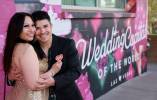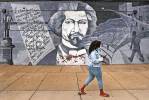Examining gay marriage, separating church and state
Here’s how I read the sociocultural tea leaves: If you’re fighting in the army that’s waging war against gay marriage, or, said another way, if you understand yourself to be fighting to protect and preserve the institution of marriage from being diluted, distorted or otherwise offended by including homosexual partners … well, I strongly encourage you to run a white flag up the flagpole right now. Stop the metaphorical scorched earth bombing runs. Give up. Quit.
Because you lost.
It’s only a matter of time. America is speaking and has spoken. If I were a betting man, I’d put gay marriage right up there next to legalizing marijuana. It’s gonna happen. At this point, protesters don’t look any less silly than Alabama Gov. George Wallace who, 50 years ago this June, stood in front of Foster Auditorium at the University of Alabama to take on the National Guard and a federal court order by “shouting into a snowstorm” to prevent black people from enrolling at the heretofore all-white school. He then stepped away proudly, having fulfilled his campaign promise to defend our right to be irrelevant.
This is not to say that historical struggles for racial justice are in every way analogous to current struggles for psychosexual identity justice. Nor am I saying that every critical inquiry or protest to gay marriage is evidence of ignorance, prejudice or that tired conversation stopper (cue drum roll) homophobia.
I have critical questions about gay marriage. My concerns have to do with symbols and that which symbols articulate and protect — meaning! (see C.G. Jung, Joseph Campbell, et al.). When symbols devolve or die, meaning is threatened. And when meaning is threatened, human beings feel threatened. Off balance. Unsure. People unwilling to honestly face these uncertainties and insecurities have no other alternative but to behave oddly. Or prejudicially. Or badly. Or violently.
Speaking specifically to Jews, Christians and Muslims , each of these groups trace the symbolic meaning of the word “marriage” back to the creation stories in Genesis. God creates humankind in God’s image. “Male and female did God make Man.” The theological conclusion of these religions is that marriage is a symbol and witness to the world of God reconciling the wholeness of Godself in love, fidelity and steadfastness.
Marriage, in these traditions, isn’t a container for romance and great sex, though certainly quality marriages grow plenty of both over a lifetime. Rather, theologically understood, marriage is a symbol and a vocation.
I take it as self-evident that men aren’t women, and women aren’t men. So, if two women or two men decide to enter upon a life partnership of love and fidelity wrapped in a symbol, and if they call that symbol “marriage,” then it follows logically that the symbol would have to be in some ways deconstructed and reconstructed.
But, Jews, Christians and Muslims lost the argument the moment their theology got in bed with the U.S. government and the issuance of marriage licenses. In so doing, theological concerns rightly were subordinated to a nation bent on keeping “church and state” separate. See, seen from a completely secular, objective “American” viewpoint, my Christian theology of marriage (described above) is nothing more than Steven’s religious preference and prejudice. Which he’s welcome to have in this country. But he’s not welcome to advance his religious worldview onto other Americans, .
If they asked, I would tell the Christians, right now, to radically separate the solemnization of marriage vows from the event of acquiring a marriage license. Then any couple could acquire a marriage license (gay or straight). Couples with marriage licenses could then approach their preferred religious group and seek religious solemnization vows. Individual denominations (Baptists, Methodists, Roman Catholics, Episcopalians, etc.) would be free then, to include or exclude any couple (gay or straight) from the marriage symbol (as they understand the meaning thereof.) They would also be free to craft a new, emerging theological understanding of gay life partnership, articulating its own unique witness and vocation in the world.
From a strict constitutional view, gay marriage is not a moral issue. It’s a justice issue.
Steven Kalas is a behavioral health consultant and counselor at Las Vegas Psychiatry and the author of “Human Matters: Wise and Witty Counsel on Relationships, Parenting, Grief and Doing the Right Thing” (Stephens Press). His columns appear on Sundays. Contact him at 227-4165 or skalas@reviewjournal.com.























